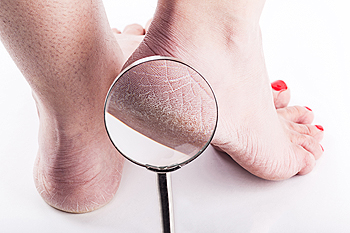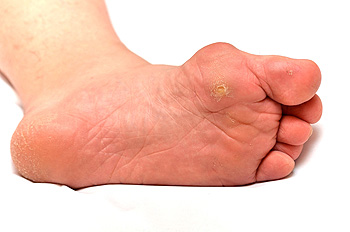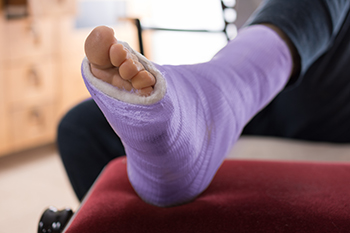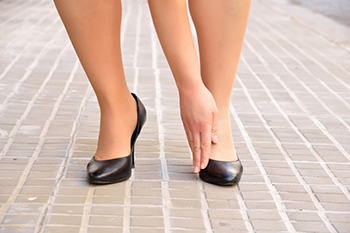Connect With Us
Blog
Items filtered by date: December 2023
Can Vitamin Deficiencies Cause Cracked Heels?

Cracked heels are a common foot problem, causing discomfort and often aesthetic concerns. While several factors contribute to this issue, vitamin deficiency is an often overlooked culprit. Specifically, vitamins A, C, and E play important roles in maintaining skin health. Vitamin A is essential for skin repair and maintenance. This type of deficiency can lead to dry, flaky skin, making it more prone to cracking. Vitamin C is known for its role in collagen production, a protein vital for skin strength and elasticity. Without enough vitamin C, skin can become fragile and susceptible to fissures. Additionally, vitamin E is a powerful antioxidant that helps protect skin from damage and maintains its moisture balance. A shortage of vitamin E can result in dry, rough skin, making the heels more likely to crack. To combat cracked heels, a balanced diet rich in these essential vitamins, along with proper foot care, is essential. Ensuring you have an adequate intake of these vitamins can go a long way in keeping your heels smooth and healthy. If you have cracked heels, it is strongly suggested that you are under the care of a podiatrist who can offer effective prevention techniques and treatment for this condition.
Cracked heels are unsightly and can cause further damage to your shoes and feet. If you have any concerns, contact one of our podiatrists from Southwest Podiatry. Our doctors can provide the care you need to keep you pain-free and on your feet.
Cracked Heels
Cracked heels appear unappealing and can make it harder for you walk around in sandals. Aside from looking unpleasant, cracked heels can also tear stockings, socks, and wear out your shoes. There are several methods to help restore a cracked heel and prevent further damage.
How Do You Get Them?
Dry skin is the number one culprit in creating cracked heels. Many athletes, walkers, joggers, and even swimmers suffer from cracked heels. Age and skin oil production play a role to getting cracked heels as well.
Promote Healing
Over the counter medicines can help, especially for those that need instant relief or who suffer from chronic dry feet.
Wear Socks – Wearing socks with medicated creams helps lock in moisture.
Moisturizers – Applying both day and night will help alleviate dryness which causes cracking.
Pumice Stones – These exfoliate and remove dead skin, which allows for smoother moisturizer application and better absorption into the skin.
Change in Diet
Eating healthy with a well-balanced diet will give the skin a fresh and radiant look. Your body responds to the kinds of food you ingest. Omega-3 fatty acids and zinc supplements can also revitalize skin tissue.
Most importantly, seek professional help if unsure how to proceed in treating cracked heels. A podiatrist will help you with any questions or information needed.
If you have any questions, please feel free to contact our offices located in Dallas, and Carrollton, TX . We offer the newest diagnostic and treatment technologies for all your foot care needs.
Wounds That Don't Heal Need to Be Checked
Causes of Corns on the Feet

Foot corns are thickened patches of skin that form due to friction and pressure. Common symptoms can include rough, yellowish, sensitive skin on the toes, which can be painful when wearing shoes. Corns can develop in various areas of the feet, including below the toenails, between the toes, on the sides of the foot, and on the soles. Wearing tight shoes or standing for extended periods of time may cause corns to develop. If you have persistent or worrying foot corns, it is suggested that you schedule an appointment with a podiatrist for professional removal, which may involve scraping, shaving, or cutting the corn layers over multiple appointments.
Corns can make walking very painful and should be treated immediately. If you have questions regarding your feet and ankles, contact one of our podiatrists of Southwest Podiatry. Our doctors will treat your foot and ankle needs.
Corns: What Are They? And How Do You Get Rid of Them?
Corns are thickened areas on the skin that can become painful. They are caused by excessive pressure and friction on the skin. Corns press into the deeper layers of the skin and are usually round in shape.
Ways to Prevent Corns
There are many ways to get rid of painful corns such as:
- Wearing properly fitting shoes that have been measured by a professional
- Wearing shoes that are not sharply pointed or have high heels
- Wearing only shoes that offer support
Treating Corns
Although most corns slowly disappear when the friction or pressure stops, this isn’t always the case. Consult with your podiatrist to determine the best treatment option for your case of corns.
If you have any questions please feel free to contact our offices located in Dallas, and Carrollton, TX . We offer the newest diagnostic and treatment technologies for all your foot and ankle needs.
Anatomy of Foot Stress Fractures

Stress fractures are tiny cracks in bones, often seen in the feet due to repetitive stress. Two main types of these fractures exist, consisting of fatigue fractures from overuse and insufficiency fractures in weakened bones. Common in weight-bearing bones like the metatarsals, these fractures result from activities like running and jumping. Symptoms can include localized foot pain and swelling. Diagnosis through imaging is essential. Relief involves rest, reducing impact on the feet, and sometimes using supportive devices, such as crutches or braces. If you have endured a foot stress fracture, it is suggested that you visit a podiatrist who can accurately diagnose and treat this condition.
Activities where too much pressure is put on the feet can cause stress fractures. To learn more, contact one of our podiatrists from Southwest Podiatry. Our doctors can provide the care you need to keep your pain free and on your feet.
Dealing with Stress Fractures of the Foot and Ankle
Stress fractures occur in the foot and ankle when muscles in these areas weaken from too much or too little use. The feet and ankles then lose support when walking or running from the impact of the ground. Since there is no protection, the bones receive the full impact of each step. Stress on the feet can cause cracks to form in the bones, thus creating stress fractures.
What Are Stress Fractures?
Stress fractures occur frequently in individuals whose daily activities cause great impact on the feet and ankles. Stress factors are most common among:
- Runners
- People affected with Osteoporosis
- Tennis or basketball players
- Gymnasts
- High impact workouts
Symptoms
Pain from the fractures occur in the area of the fractures and can be constant or intermittent. It will often cause sharp or dull pain with swelling and tenderness. Engaging in any kind of activity which involves high impact will aggravate pain.
If you have any questions please feel free to contact our offices located in Dallas, and Carrollton, TX . We offer the newest diagnostic and treatment technologies for all your foot and ankle needs.
The Toll High Heels Take on Feet

The allure of high heels is undeniable, offering a boost of confidence and a stylish edge to an outfit. However, the fashionable appeal comes at a cost, as prolonged wear of high heels can lead to a myriad of foot problems. One of the most common issues is the alteration of the foot's natural alignment, placing excessive pressure on the ball of the foot and toes. This imbalance can contribute to the development of painful conditions such as bunions and hammertoes. The elevated position of the heel can strain the Achilles tendon, leading to discomfort and increasing the risk of injuries. Continuous wear may also cause the calf muscles to tighten, affecting overall foot flexibility. Furthermore, high heels can contribute to the development of calluses, corns, and even stress fractures. While high heels undoubtedly add flair to an ensemble, it is essential to be mindful of the potential consequences and prioritize foot health to avoid long-term complications. If you are dealing wit foot problems caused from frequently wearing high heels, it is suggested that you schedule an appointment with a podiatrist.
High heels have a history of causing foot and ankle problems. If you have any concerns about your feet or ankles, contact one of our podiatrists from Southwest Podiatry. Our doctors can provide the care you need to keep you pain-free and on your feet.
Effects of High Heels on the Feet
High heels are popular shoes among women because of their many styles and societal appeal. Despite this, high heels can still cause many health problems if worn too frequently.
Which Parts of My Body Will Be Affected by High Heels?
- Ankle Joints
- Achilles Tendon – May shorten and stiffen with prolonged wear
- Balls of the Feet
- Knees – Heels cause the knees to bend constantly, creating stress on them
- Back – They decrease the spine’s ability to absorb shock, which may lead to back pain. The vertebrae of the lower back may compress.
What Kinds of Foot Problems Can Develop from Wearing High Heels?
- Corns
- Calluses
- Hammertoe
- Bunions
- Morton’s Neuroma
- Plantar Fasciitis
How Can I Still Wear High Heels and Maintain Foot Health?
If you want to wear high heeled shoes, make sure that you are not wearing them every day, as this will help prevent long term physical problems. Try wearing thicker heels as opposed to stilettos to distribute weight more evenly across the feet. Always make sure you are wearing the proper shoes for the right occasion, such as sneakers for exercising. If you walk to work, try carrying your heels with you and changing into them once you arrive at work. Adding inserts to your heels can help cushion your feet and absorb shock. Full foot inserts or metatarsal pads are available.
If you have any questions please feel free to contact our offices located in Dallas, and Carrollton, TX . We offer the newest diagnostic and treatment technologies for all your foot and ankle needs.

